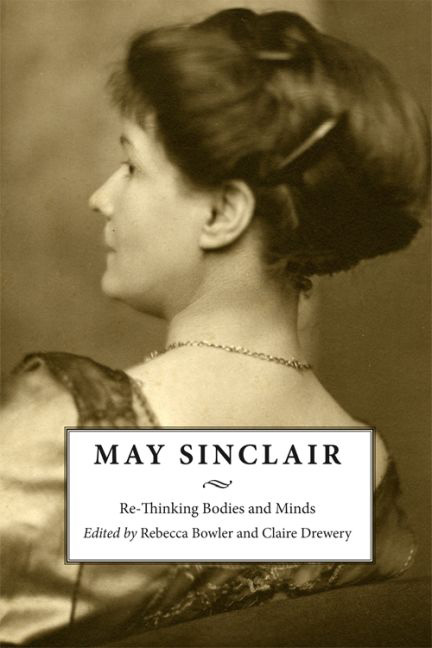Book contents
- Frontmatter
- Contents
- Acknowledgements
- Introduction: May Sinclair's Interdisciplinarity
- Part I The Abstract Intellect
- Part II Abject Bodies
- 6 Disembodying Desire: Ontological Fantasy, Libidinal Anxiety and the Erotics of Renunciation in May Sinclair
- 7 May Sinclair and Physical Culture: Fit Greeks and Flabby Victorians
- 8 Dolls and Dead Babies: Victorian Motherhood in May Sinclair's Life and Death of Harriett Frean
- 9 Why British Society Had to ‘Get a Young Virgin Sacrificed:’ Sacrificial Destiny in The Tree of Heaven
- 10 ‘Odd How the War Changes Us’: May Sinclair and Women's War Work
- 11 Transgressing Boundaries; Transcending Bodies: Sublimation and the Abject Corpus in Uncanny Stories and Tales Told by Simpson
- Notes on Contributors
- Index
6 - Disembodying Desire: Ontological Fantasy, Libidinal Anxiety and the Erotics of Renunciation in May Sinclair
from Part II - Abject Bodies
Published online by Cambridge University Press: 26 May 2017
- Frontmatter
- Contents
- Acknowledgements
- Introduction: May Sinclair's Interdisciplinarity
- Part I The Abstract Intellect
- Part II Abject Bodies
- 6 Disembodying Desire: Ontological Fantasy, Libidinal Anxiety and the Erotics of Renunciation in May Sinclair
- 7 May Sinclair and Physical Culture: Fit Greeks and Flabby Victorians
- 8 Dolls and Dead Babies: Victorian Motherhood in May Sinclair's Life and Death of Harriett Frean
- 9 Why British Society Had to ‘Get a Young Virgin Sacrificed:’ Sacrificial Destiny in The Tree of Heaven
- 10 ‘Odd How the War Changes Us’: May Sinclair and Women's War Work
- 11 Transgressing Boundaries; Transcending Bodies: Sublimation and the Abject Corpus in Uncanny Stories and Tales Told by Simpson
- Notes on Contributors
- Index
Summary
She envied her youth its capacity for daydreaming, for imagining interminable communions. Brilliant hallucinations of a mental hunger. Better than nothing […] Your mind would die in a delirium of hunger. (Sinclair 1980a: 314)
Ontological Fantasy
In a well-travelled passage of The Phenomenology of Spirit, Hegel writes, ‘The true is the whole, But the whole is nothing else than the essence consummating itself through its development. Of the Absolute, it must be said that it is essentially a result, that only in the end is it what it truly is’ (1979: 11–12). Franco Moretti echoes this passage in his theory of the classical Bildungsroman. Arguing that the novel of formation neatly dovetails ‘the ending and the aim of narration’ (55), he emphasises that, ‘for Hegel the marriage of Truth and the Whole is celebrated at the end of a story’ (1987: 60). While Moretti critiques this narrative of wholeness, May Sinclair invests in such ‘interminable communions’, adhering to the trajectory of ‘“idealised and transfigured embodiment”’ (John Elof Boodin, quoted in Sinclair n.d.: 20). Performing her own alchemical transposition of philosophy into literary theory, ontological significance – indeed, subjectivity itself – is posited as the achievement of the ‘whole, gorgeous, concrete, and abundant life’ of Hegel's Absolute (Sinclair 1917: 349). Sinclair's narratives seek this transfiguring consummation in an attempt to guarantee what Jacques Lacan calls the point de capiton, a ‘quilting point’ to secure unified subjectivity: ‘[T]he point of convergence that enables everything that happens in this discourse to be situated retroactively and prospectively’ (1997: 268). In a textual bid for Hegelian wholeness, Sinclair employs philosophical idealism and psychology as tools for ‘psycho-synthesis’. Reader and protagonist are discursively ‘situated’ so as to be ‘lured by the vision of that “Sublimation” which is held out before him as the end’ (Sinclair 1916: 119).
Sinclair's narratalogical assumptions suggest the triumphant attainment of ontological transcendence: the tale not of a fragmented subject, but of desire fulfilled and lack overcome. But what if Sinclair's theoretical lure is merely a structural assertion that remains incommensurable with the body of the text? Her denouements frequently resonate with ambivalence, contradicting their narrative trajectory.
- Type
- Chapter
- Information
- May SinclairRe-Thinking Bodies and Minds, pp. 119 - 138Publisher: Edinburgh University PressPrint publication year: 2017

